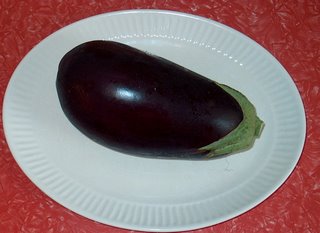Eggplantua

The eggplant pictured was larger than some European countries.
After several weeks of cooking with farm box eggplants, I have reached the conclusion that they will never be a favorite vegetable. People always rave about their versatility. Yeah, you can do anything with them, but they’re slimy. They oxidize but you can’t really hit them with lemon. They require coddling without much payoff. Consider the artichoke, literally a thistle—you can hurt yourself while preparing it, it needs lots of lemon juice and even more time to cook, it refuses to go with wine. But the payoff! You have an excuse to eat mayonnaise or butter. Even if you are attempting virtue and leave your artichoke naked, it tastes uniquely of itself. It plays well with others, divine with chicken, lovely in pasta. Eggplant lovers make all these claims, too, but I find them unsubstantiated.
Last night’s meal was a case in point. Last summer I acquired Paula Wolfert’s The Cooking of Southwest France, a fantastic cookbook. I wanted to cook everything in it, but most of the recipes call for several days planning ahead and were rather heavy for summer. But summer’s gone, and it was a weekend. I landed on Duck Leg Ragout with Green Olives and Eggplant. Aha! I thought. A way to use up the Lichensteinian monster in the fridge and eat duck.
I read out the recipe to Hockeyman as he lolled about in bed.
“It sounds very complicated,” he said.
“No. It just takes a long time.”
In the spirit of not wanting to rip off anybody, much less Paula Wolfert (I can see the kitchen witches of America banding together in a pack, their brooms pointed furiously in my direction....), her recipes are on pages 189 and 334 of Southwest. In true Bk-doesn’t- have- that -in -her -kitchen style, I deviated somewhat.
BK Ingredient list:
Four duck legs (Pekins, I think. They were small.)
Salt and pepper
I shallot
Three small tomatoes, chopped.
1 large thyme sprig
1 Bay leaf
about a half cup chicken stock
1/3 cup dry white wine
Sliced french bread, rubbed with garlic and toasted in the oven
One Recipe for Sauteed Eggplant
One enormous Italian Eggplant
Kosher salt
1 ½ tablespoons duck fat
pinch sugar
1 tsp chopped garlic
salt and pepper
½ cup olives. The original recipe calls for green, but I had only black.
About an hour before you begin cooking, peel your eggplant, cube it, and mix the kosher salt with the vegetables in a strainer. Leave it sit in your sink.
Now, your duck. Put some duck fat in a heavy skillet or your Le Creuset. Heat it, then brown the duck legs. Remove them to a plate; pour off the fat.
Add the shallot to the pot. Cook it for about five minutes, stirring, then add the tomatoes, thyme, and bay leaf. Let everything get to know one another briefly, as Fergus Henderson would say. Add the wine and stock. Bring everything to a boil. Put the duck legs back in, turn down the heat, and allow it simmer for about ninety minutes—cooking time depends on the size of your duck legs.
Notes: if, like me, you have a crummy electric oven with three working burners instead of a stainless steel Viking, temp control might prove troubling. I had difficulty moderating to a nice, low simmer stovetop, and the resulting duck flesh wasn’t as tender as I’d like. Next time I’ll put this in a 300 degree oven.
Whilst your duck cooks...
Drink some wine. Contemplate your cubed eggplant. Paula says you must rinse it, then squeeze as must moisture as possible from the cubes with your hands. Good luck.
Now heat some duck fat in a skillet. Add the eggplant. Cover.
Paula says your eggplant will brown and plump up. Mine didn’t. It collapsed sullenly, then sucked up all the duck fat. I gave up on golden browning and added the pinch of sugar, stirring the apportioned eight to ten minutes. I could have then moved the pan off the flame until the duck was done, but the eggplant so damp that I turned the burner to low and let it sit, which, as far as I could tell, neither harmed nor improved matters.
Do the dishes. Stir the duck. Poke at the eggplant. Chop up your garlic and olives. If your olives are green, you might need to soak them in water a bit to desalt them.
Test your duck. It should be fork tender, smell wonderful, and cause your cat, dog, or significant other to be hovering, making hungry noises.
Add the garlic and olives to the eggplant, then dump all into the duck pan. Let everything sit together over low heat while you toast the garlic-rubbed french bread.
Serve. Eat.
Additional notes:
Hockeyman thought the dish excellent. I would’ve liked it better without the eggplant.
We had a lot of leftover sauce. I saved the duck bones (picked clean) for broth, and made a pasta sauce with what was left. Fearing shortages of feed, I added several small tomatoes, three garlic cloves, and a healthy dose of red wine. I served this over rigatoni. We agreed it was even better the second night. I attribute this in part to the tomatoes being the dominant flavor note. Still, faced with another Lichenstenian eggplant, I would make this again.
Wolfert, Paula: The Cooking of Southwest France. New Jersey: John Wiley and Sons, 2005.






0 Comments:
Post a Comment
<< Home